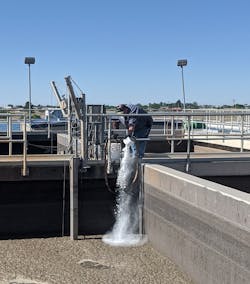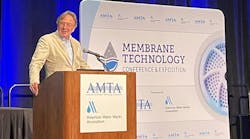For years, the wastewater treatment plant in Lovington, N.M., was having settling problems in their sequencing batch reactor (SBR) tanks. They were overloaded with solids, but they were wasting mostly water.
The City of Lovington is a city of approximately 12,000 people in southeastern New Mexico. They operate a 2.5 MGD-rated activated sludge SBR plant with a flow of about 1.3 MGD. There are two SBR tanks, two aerobic digesters, and a screw press is used for sludge dewatering. Only one industrial user — a jet fuel refinery — contributes to the plant’s flow. The wastewater treatment plant is run by Superintendent Miguel De La Cruz, who is assisted by five operators and one lab technician.
In 2009, Dan Ward from BICI Chemicals was consulted to help the WWTP remain in compliance. Ward suggested two products, AT-318 and Aqua Aide, to resolve their problems. AT-318 is an all-natural physical flocculant and settling aid. The combination of the two products reduces phosphorus, controls filamentous bacteria bulking, dewaters sludge and more.
WWTP workers performed microscopic tests and found out that the plant was overrun with filamentous bacteria and nocardia. They also had high levels of FOG.
To jump-start the process, BICI Chemicals applied a shock load of AT-318 and Aqua Aide. Afterward, the city started daily dosing, and within a couple of days, they noticed that the solids were settling. The waste flow to the digesters from the SBRs had actually thickened. It was at approximately 0.5 percent solids before AT-318 and Aqua Aide. After AT-318 and Aqua Aide, it had gone up to 2 percent solids.
“AT-318 and Aqua Aide are unlike other products in the sense that it keeps on working after it is activated,” De La Cruz said. “It does not lose its effectiveness after it is introduced into our SBRs. After wasting, it continues to work in our digesters. Our plant actually had to reduce the daily dosing to only 4 days a week. The solids in our digester were thickening so much, that our screw press was having trouble pumping them for dewatering,”
Since AT-318 and Aqua Aide was introduced into Lovington’s treatment plant, FOG and filamentous bacteria have become almost non-existent. Their solids settle extremely well in the SBRs, and as a result of increased thickening in the solids in the digesters, they have also noticed a decrease by about 25 percent in polymer usage in their screw press. WW
BICI Chemicals offers effective solutions to problems in the collection and treatment of wastewater and potable water. For more information, visit www.bicichemicals.com.



